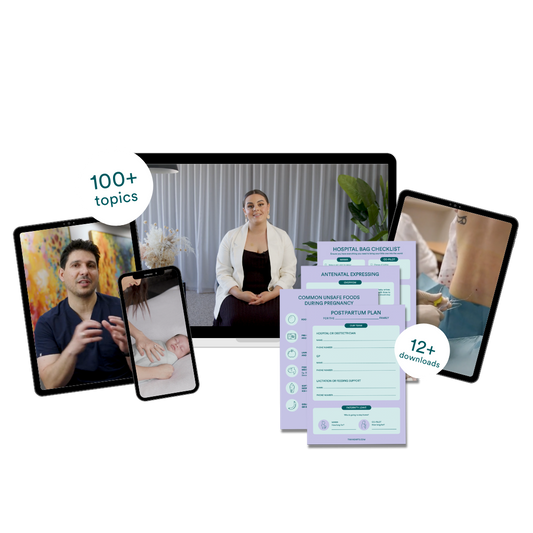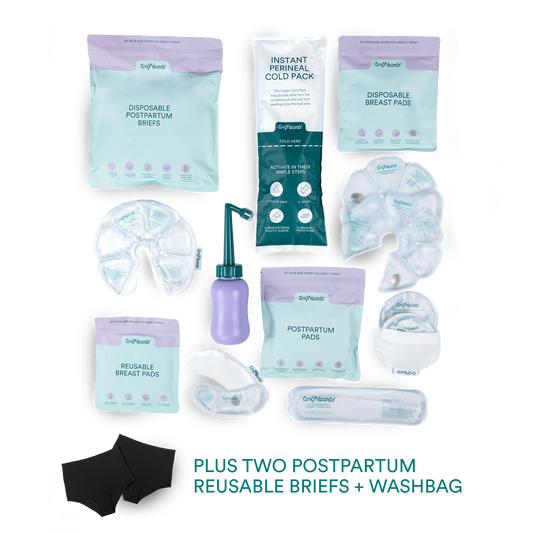Did you know that it is more common for baby boys to suffer UTI's in the first year of life than it is for girls? We certainly didn't, but unfortunately, it didn't take long for us to discover this.
It all started on the 9th November 2019, our little man, Harrison, was 3.5 months old and had started showing early signs of (what we thought) teething. He ticked all the criteria for what we as parents are so often told the teething signs are - irritable, red/flushed cheeks, nappy rash, distressed, and feverish.
We thought it was a little bit early but knew it wasn't uncommon, so we gave him Panadol and a frozen teething ring to try and soothe him. But unfortunately, the soothe was only temporary, and by the next day, he had only worsened. By 9 pm we were quite concerned, his temperature was reaching a high of 39, and he was getting more and more unsettled.
Almost the minute the Panadol would wear off, Harrison's fever would spike to 39; he would develop rigour shakes and start screaming inconsolably until the next dose would kick in. This concerned us greatly, so we took him to emergency at 6 am the following morning (11/11/19). By 9:30 am we had been seen and completed a urine test (which was a lot of fun trying to catch a clean line of urine from a 3month old wriggly baby) and had the results.

It was a confirmed UTI (not teething at all!), they suspected it was quite bad and most likely in his kidneys, so recommended IV antibiotics and a minimum 24-hour stay. However, finding a viable vein in a healthy-sized (99th percentile) baby proved to be quite difficult. It had been 2 hours, and they had attempted four times, which was quite traumatic for both myself and Harrison. I was so thankful to my Mum for being there (hubby was on his way from work but was a while away, so Mum came to our rescue!) to support me while I comforted Harrison.
Since we had already been through a bit of trauma, they decided to give him a double dose of antibiotics through an Intramuscular injection in both his thighs. By 1 pm we were admitted to the children's ward and told it could be up to a 10-day stay, but we would have to wait until the blood test results came in and the paediatric team saw us.
The following day at 6 am, the paediatric doctors did their rounds and came to update us. They informed us that the bacteria had entered his bloodstream, and it had become even more important to get a successful IV into him for antibiotics. They recommended a scalp vein, which sounded horrific at first, but they quickly explained that due to minimal hair and muscle, it would be the easiest and quickest access and would actually bother him the least.
I requested we wait until my husband, Sam, arrived so I could have his support (I was not prepared to see Harrison in so much distress again!). Thankfully, they succeeded first go, and it was minimal distress for Harrison. They were able to make a makeshift hat of some sort to cover the entry site; it reminded us of the Mad Hatter! At 10:30 am, the doctors came around again and recommended we do a spinal tap to be sure the bacteria was not in his spinal fluid or had entered his brain.


The process of a spinal tap is quite distressing and traumatic for bubs - it is a full sterile procedure, with a nurse holding the baby, in the fetal position, under a sterile drape. This can be quite difficult as babies of Harrison's age can be quite strong (and we knew he was!), and they must stay very still in the fetal position. Due to the requirement that the procedure be sterile and we would not be allowed to comfort Harrison, it was recommended we wait outside. We had the results within half an hour of the test being completed, and it had come back clear!
We were recommended to stay for seven days with the IV drip. Thankfully by the third day, Harrison had somewhat returned to his happy self, constantly melting all the nurse's hearts! He was feeding, sleeping and taking to the antibiotics quite well, so we were reassured we would be able to go home after five days, and change to oral antibiotics for five days following.
Harrison was back to his normal self by the time we went home and took to the oral antibiotics very well! We were still concerned though - on my husband's side, there is a history of dilated ureters and kidney reflux, so we requested tests be done to rule this out. They wouldn't be able to do these tests until a few months after the UTI had cleared, and it was unlikely they would find anything due to his age. Unfortunately, before we were able to do these tests, Harrison suffered another UTI.
On the 25th February 2020, he had fevers up to 39 again, was extremely unsettled, drowsy and irritable. He wasn't feeding well and was just a different baby. So we made the decision to take him to emergency again. Unfortunately, he was diagnosed with another UTI, but we were discharged within the hour with oral antibiotics. But unfortunately, he worsened overnight, his fevers were still reaching 39 and the rigour shakes had come back, so we decided to take him back to emergency.
We were quite persistent with explaining what had happened last time and that oral AB's wouldn't be enough, but that we needed the head of the department to attempt the IV's given the many attempts from last time. Unfortunately, this didn't happen, and again, it took five failed attempts for the head of the department to come in. Both Harrison and myself were quite distressed at this stage. He was now six months old, extremely strong and was wanting to crawl everywhere and (understandably!) not be held down.
The lead doctor advised no more IV attempts, and to get the AB in via intramuscular injection instead. We were relieved! We were admitted overnight. The following morning we were told by the nurses that the doctors would be around to update us soon, but unfortunately, we weren't seen until 4 pm - a very long day indeed! Harrison was still very unsettled - he was barely feeding, didn't want to be touched and would only sleep in his cot (very unlike him!). Due to this, the doctors advised a feeding tube if things didn't improve. At this stage, their only concern was his lack of feeding and his overall manner. So they reassured us that once this had improved, we would be able to go home with oral AB cover.

Thankfully, overnight he had improved significantly - feeding was back to normal, and he was his happy self, giving smiles to all! We were able to go home that day, and thankfully, all tests since have come back clear, and there have been no further UTI's or issues for Harrison. We are so thankful for the Australian Health Care System, the wonderful nurses that helped look after our boy, and the doctors that treated him.








